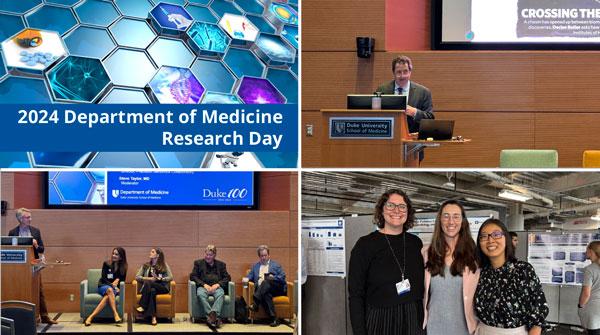
Moving medicine forward means getting out of your comfort zone, thinking outside the box, collaboration and innovation are key takeaways from the Department of Medicine’s second annual Research Day on November 7 — an event that underscored writ large the department’s unwavering commitment to research, academics, and to strengthening the internal medicine research community.
Opening the day, Department of Medicine Chair Dr. Kathleen Cooney “doubled down” on that commitment.
“Research is fundamental to what we do every day,” she said. “I can’t imagine an academic department as big as us stepping away from our commitment to discovery science, understanding the underpinnings of human disease and, more importantly, bringing new treatments and approaches to managing patient populations locally and worldwide. I want to be super loud and clear about that message.”
Medicine Grand Rounds keynote speaker Dr. Mark Gladwin, dean, University of Maryland School of Medicine echoed the day’s themes in his presentation, Translating Redox Biology to Medicine: Lessons Learned, Taking Risks, and Going NO Where. “Always in a long career in academic medicine, get out of your comfort zone,” he said. “Go to that foreign place. Don’t just always go to what you know and what you’re good at.”
Vice Chair for Research Dr. Scott Palmer and Dr. Matthew J. Crowley, MD, co-director for Research Development, reiterated the department’s ongoing support for research at all levels, via the Research Development Council, the Faculty Development Academy, which was just reimagined as more user-friendly, and the Fellows Research Academy, now 65 members strong; programs that have grown as part of the department’s ongoing strategic commitment to further strengthen research programming.
Medicine Research Stars
This year’s Research Day drew over 90 posters and featured some of the department’s research stars.
-
Dr. Joshua Parsons, assistant professor in Infectious Diseases, in a recent study provided the best evidence to date for the significance of bacterial persister cells in the failure of antibiotics in the clinic.
-
Dr. Deepshikha Ashana, assistant professor in Pulmonary, Allergy, & Critical Care Medicine, is researching and addressing inequities in critical care medicine among underserved patients with work on trauma-informed care and stress, race and shared decision making, and the challenge of emergency abortion care following the Dobbs ruling.
-
Dr. Charity Oyedeji, assistant professor in Hematology, is pioneering sickle cell disease (SCD) work with the SILVR Study to identifying geriatric syndromes in adults with SCD.
-
Dr. Catherine Sims, clinical associate in the Division of Rheumatology, presented study findings suggesting that BAFF early in pregnancy may be a novel risk factor for poor pregnancy outcomes in women with systemic lupus erythematosus, particularly Black women with aggressive lupus.
-
Somenath Datta PhD, postdoctoral associate, Duke Molecular Physiological Institute, shared promising study finding suggesting that measurement of IFN-γ-induced chemokine expression in iPSC-podocytes of HRG carriers could serve as a tool for predicting the likelihood of future incidence of acute kidney disease.
-
Jonathan Campbell, PhD, associate professor, division of Endocrinology, Metabolism, and Nutrition, shared his work exploring the physiological and pharmacological relevance of alpha to beta cell communication as a central node for postprandial metabolism.
-
Dr. Christina Wyatt MD, interim division chief for Nephrology, presented One Duke: Leveraging Strategic Partnerships with Institutes and Centers, highlighting studies from the (IGNITE) Pragmatic Clinical Trials Network, an NIH-funded mechanism dedicated to supporting the implementation of genomics in health care. Dr. Wyatt is also a co-principal investigator for ERASE-KD, a national consortium designing and testing interventions to address structural racism and its effect on health disparities among people living with kidney disease.
Panel: Driving Duke’s “Outrageous Ambition”
Today, DOM research centers and institutions continue to articulate Duke University’s drive to honor its “outrageous ambitions,” as described by former Duke President Terry Sanford, highlighting the Medical Center’s brilliant reputation and focus on excellence in his final annual address to faculty 40 years ago.
Good ideas tend to remain evergreen— universally and continually relevant, said Dr. Steve Taylor, professor in the Division of Infectious Diseases who moderated a panel discussion with DOM strategic research partners on Driving Duke’s “Outrageous Ambitions” through Biomedical Research.
Panelists included Dr. Adrian Hernandez, executive director, Duke Clinical Research Institute (DCRI), Dr. Susanna Naggie, director, Duke Clinical and Translational Sciences Institute (CTSI), Chris Newgard, PhD, director, Duke Molecular Physiology Institute (DMPI), and Dr. Svati Shah, director, Duke Precision Genomics Collaboratory.
Dr. Taylor prompted a lively discussion about how these institutions provide a strong support platform for research at Duke; support that may not have otherwise been available.